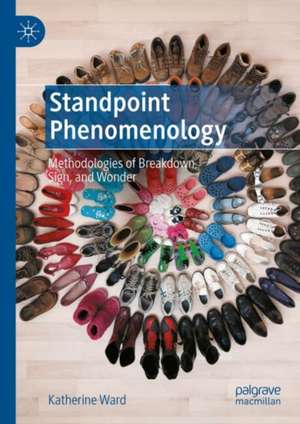Standpoint Phenomenology: Methodologies of Breakdown, Sign, and Wonder
Autor Katherine Warden Limba Engleză Hardback – 18 mai 2024
Preț: 695.70 lei
Preț vechi: 818.46 lei
-15% Nou
Puncte Express: 1044
Preț estimativ în valută:
133.13€ • 142.35$ • 110.99£
133.13€ • 142.35$ • 110.99£
Carte disponibilă
Livrare economică 27 martie-10 aprilie
Preluare comenzi: 021 569.72.76
Specificații
ISBN-13: 9783031554551
ISBN-10: 3031554558
Pagini: 187
Ilustrații: XI, 187 p.
Dimensiuni: 148 x 210 mm
Greutate: 0.39 kg
Ediția:2024
Editura: Springer Nature Switzerland
Colecția Palgrave Macmillan
Locul publicării:Cham, Switzerland
ISBN-10: 3031554558
Pagini: 187
Ilustrații: XI, 187 p.
Dimensiuni: 148 x 210 mm
Greutate: 0.39 kg
Ediția:2024
Editura: Springer Nature Switzerland
Colecția Palgrave Macmillan
Locul publicării:Cham, Switzerland
Cuprins
Chapter 1: The Problem of Standpoint in Phenomenology.- Chapter 2: Standpoint Epistemology/Standpoint Phenomenology.- Chapter 3: Three Methodologies: Breakdown, Sign, & Wonder.- Chapter 4: The Methodology of Breakdown as a Standpoint Approach.-
Chapter 5: Of Signs and Signals.- Chapter 6: Wonder and Standpoint.- Chapter 7: Finding Out Who We are Together.
Notă biografică
Katherine Ward is Assistant Professor of Philosophy at Bucknell University (USA).
Textul de pe ultima copertă
This book introduces a standpoint approach to phenomenology and reconceives the phenomenological project as not an individual but a communal endeavor—one that, importantly, requires insight from across the spectrum of human experience and especially experiences of those who have traditionally been absent from the discipline. To develop this approach, the book draws on the feminist tradition of standpoint epistemology. The book borrows two of standpoint epistemology’s key theses—that of situated knowledge (what we know is shaped and often limited by our social location) and inverted privilege (epistemological advantage can in some contexts be inversely related to one’s social location). In standpoint phenomenology, these develop into the thesis of situated phenomenology and inverted phenomenological privilege respectively. This book presents three specific methodologies that support the standpoint approach to phenomenology: the methodologies of breakdown, sign, and wonder. All have their origins in the classical phenomenological work of Heidegger and Merleau-Ponty. Though these methods are used by these phenomenologists, they are not explicitly articulated or explained in any detail. The book lays out how and why these methodologies can be used to reveal the conditions supporting human existence and then highlights the role each might play in a standpoint approach to phenomenology.
Katherine Ward is Assistant Professor of Philosophy at Bucknell University (USA).
Caracteristici
Puts phenomenology in conversation with feminist standpoint epistemology Develops three methods for doing standpoint epistemology: breakdown, sign, and wonder Demonstrates how phenomenology is a collective practice
